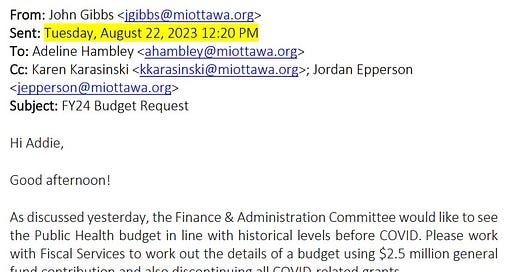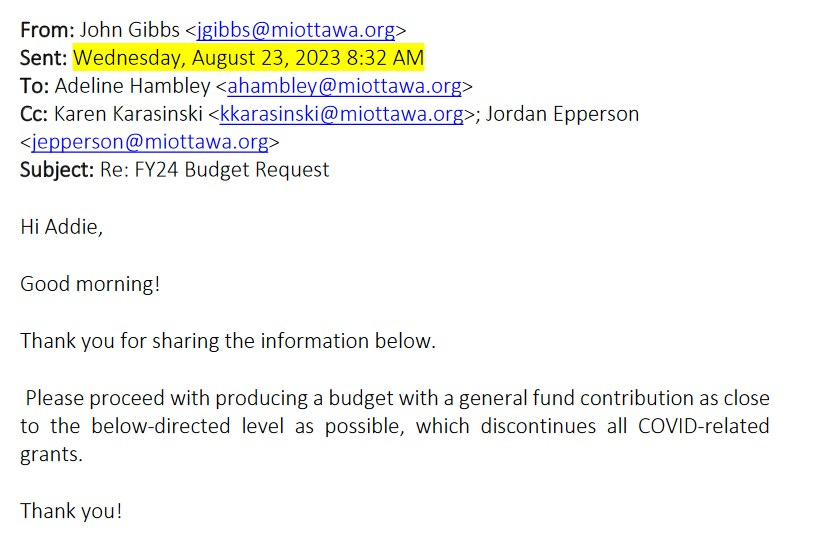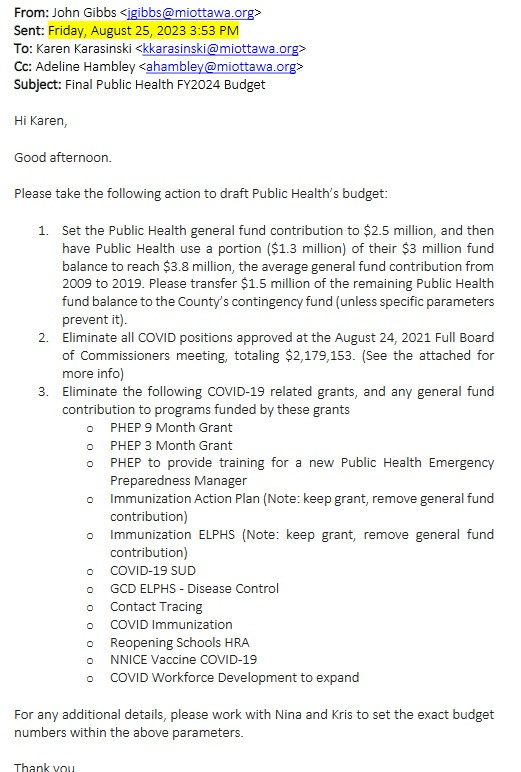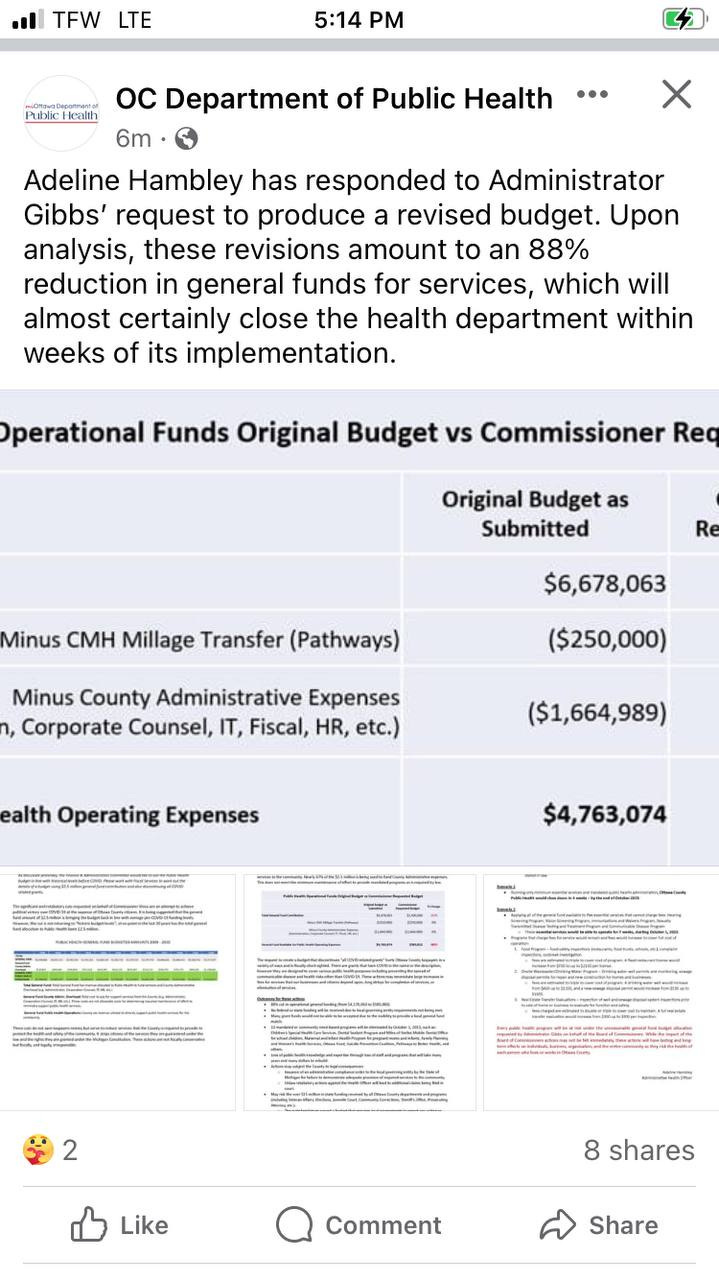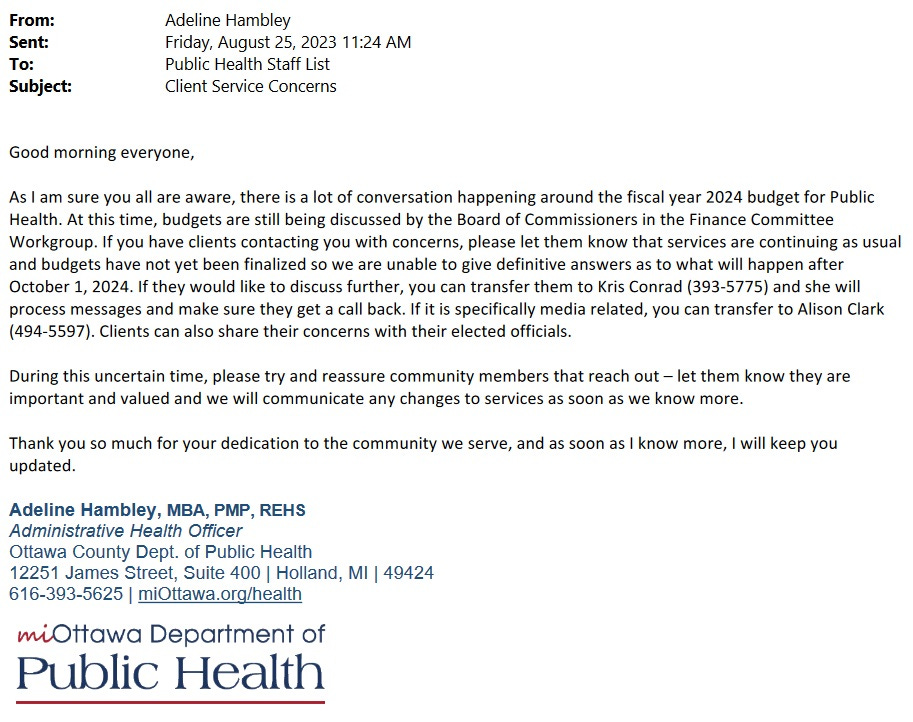Ottawa County Commissioners held a hearing Tuesday and Wednesday October 24th and 25th to determine if Ottawa County Health Officer Adeline Hambley should be removed from her position. The hearing will resume Monday, October 30, 2023 at 8:00 am when commissioners are expected to continue discussions and make a final determination via a vote.
Hambley is accused of demonstrating incompetence, misconduct, and neglect of duty by:
Making false public representations about budgetary scenarios. (p. 13)
Falsely claiming that she was not included in the budget process. (p. 17)
Failing to cooperate in the budget process. (p. 20)
Making false claims that encouraged and caused confusion, anxiety, fear, and panic in the community. (p. 21)
Hambley’s attorney, Sarah Howard, spent the majority of the hearing questioning witnesses. David Kallman, attorney for the commissioners, asked few questions in comparison. The witness list consisted of the following individuals:
Justin Roebuck Ottawa County Clerk
Marcie VerBeek Ottawa County Director of Human Resources
Karen Karasinski Ottawa County Director of Fiscal Services
Nina Baranowski Ottawa County Public Health Financial Manager
Spencer Ballard Ottawa County Environmental Health Manager
John Shay Former Ottawa County Administrator
Patrick Waterman Former Ottawa County Deputy Administrator
Paul Klimas Ottawa County IT Director
John Gibbs Ottawa County Administrator
Adeline Hambley
Although the witnesses were extensively questioned, few questions related directly to the charges against Hambley. For example, Clerk Roebuck was asked about witnessing a vote during the January 3, 2023, board of commissioners meeting, but explained he had to leave the meeting early and did not witness the vote. Human Resources Director Marcie VerBeek was asked about the unionization of county health department employees. Several witnesses were asked about the hiring of Jordan Epperson, Assistant to the County Administrator and Cindy Dryzinga, Administrative Assistant to the Board. Most witnesses made statements suggesting they had a favorable view of Hambley, but no direct knowledge or evidence related to the charges against her.
Since this was a legislative hearing and not a court proceeding, the rules for questioning witnesses were very lenient. Objections were not entertained except for when one of the attorneys wished to make a note that could presumably be used in future court proceedings, and a lot of time was spent discrediting the character of political opponents. For example, Patrick Waterman made a baseless claim suggesting Cindy Dryzinga could be using her county paid time working on political campaigns, but he quickly followed his claim with the statement, “but I have no evidence of that.” Questions were leading witnesses to certain conclusions, and hearsay was permitted. Much of the questioning that took place would likely have received objections had this been a court proceeding.
When witnesses such as Karen Karasinski, Nina Baranowski, and John Gibbs were asked about the budget process, they explained how they interacted with individuals involved in the budgeting process and described the back-and-forth exchange of information which occurred. Emails presented supported their testimony. For example, John Gibbs had initially requested staff be prepared with various budget scenarios to present to the board. After receiving direction from the board, Gibbs requested Hambley work with fiscal services to prepare a budget using a $2.5 million general fund contribution and discontinuing all COVID-related grants.
When Hambley explained that it would be impossible to accomplish this goal while meeting state requirements, Gibbs requested a budget “as close to the directed level as possible.”
Again, being told the goal was unachievable, Gibbs requested a budget with a $2.5 million general fund contribution plus $1.3 million from the fund balance.
In other words, there was a lengthy exchange that occurred over the course of several weeks that included Gibbs, Karasinski, Hambley, and others. As information was exchanged and understanding was gained, budget goals changed and were updated. The process continued until arriving at a budget which was presented to and approved by the board of commissioners.
During the budget negotiation process, on August 24, 2023, Hambley provided an update to the public. On social media it was stated, “These revisions amount to an 88% reduction in general funds for services, which will almost certainly close the health department within weeks of its implementation.”
During the hearing, Hambley argued that her claims to the public were in fact true, therefore she was justified in providing the update. After reading the update, many residents contacted their commissioners with questions and concerns. One of the charges against Hambley is that her update to the public created unwarranted fear and panic as the majority of the public did not understand that county leaders were participating in an ongoing process to finalize next year’s budget. Here is one such email.
It appears the update created some fear in county staff as well. The day following the social media post, Hambley reassured her staff that the Health Department would not be closing, and reminded them she was in the process of negotiating a budget.
On Wednesday, October 25, 2023, when Sarah Howard was finished questioning witnesses, both attorneys gave closing remarks and then the board began discussing the charges. Discussion will resume on Monday October 30, 2023. While the stated purpose of the hearing involves Hambley’s employment with the county, much of Howard’s questioning appeared to have a different aim. It appeared to be about creating narratives, discrediting people, and perpetuating misinformation, perhaps in an attempt to influence future elections and/or court proceedings.
Commissioner Belknap voiced the hidden truth. This hearing appeared to be about determining whether Ottawa County continues to follow the status quo or forges a new direction. Current county employees and main stream media seem to be working in lock-step in a way that enables them to control public opinion while increasing their personal power and encouraging government bloat. Extreme government overreach during COVID led to changes in eight county commissioner seats. Will the county bureaucracy continue to grow by seeking government grants that come with strings attached while creating and capitalizing on crisis situations, or will it begin to take actions in the best interest of the residents it serves?
